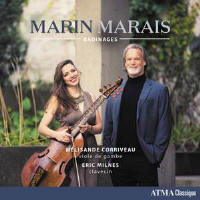Texte paru dans: / Appeared in: |
|
|
Outil de traduction ~ (Très approximatif) |
|
|
Reviewer: Bertil
van Boer
During his lifetime, Marin
Marais was regarded as France’s finest viola da gamba player, a skill, as
has often been noted, obtained both from his own talent on the instrument
and his education under the Sieur de Sainte-Colombe. Though he also studied
composition under Jean Baptiste Lully, a connection that led to his work for
the Royal Court and a fair amount of pompous court music, his concentration
on his own instrument produced a string of iconic pieces. Among the later
publications was the Quatrième Livre of 1717, a set of six suites meant for
general pedagogical purposes. As his audience was quite wide in terms of
ability, he tailored his music both for those less advanced and some who had
considerable skill. In short, there was something here for everyone, a means
of increasing the work’s distribution, even as the gamba was beginning to
decline in popularity.
This recording does not
contain the entire contents of this rather extensive volume, but rather a
selection of pieces that demonstrate Marais’s broad technical sweep, as he
himself noted. For example, the D-Major Suite (No. 2) is rather sedate, as
if any proficient, yet non-virtuoso player could grasp it. There is a nice
bit of counterpoint in the third movement (Boutade), but the imitation is
short-lived and develops into sequences that are relatively easy, as they
explore the various registers. The fifth movement (“La petite brillante”) is
the sort of light character piece that was favored by François Couperin, and
the running up and down the registers seems to depict a flighty young woman
(the title is feminine) rushing back and forth between various interests.
The final movement is a flowing and lyrical rondeau. This mirrors the Suite
d’un gout éstranger examples, the third of which, entitled “Fête champêtre”
(The Country Festival), is rustic with a growly dance in the lower
registers, sort of imitating the clumsy bucolic dancers, while the fourth,
“L’Arabesque” trips along haltingly as if pirouettes are being done is a
manner that is slightly askew from the gracious court. The first example,
“Le Badinage” (Banter) meanders a bit aimlessly in terms of its theme, as if
the “character” were simply mumbling incomprehensible words; sections are a
bit more thematically constructed, but soon these disappear into the
thematic wandering again. The first suite in D Minor opens with a mournful lament as the prelude, but the Allemande is rather more steady in terms of rhythm, and the third movement, “La Mignonne” (The Cute One) is quite self-assured, even perhaps a bit haughty in its mincing main theme. The suite concludes with a rondeau that is flowing and gracious.
In between these can be found
a couple of bits from the Second Book from 1701, which have been inserted
perhaps as a sort of comparative filler. The first is a long Chaconne where
the ostinato main theme develops into variations that push the virtuosity to
its limits, even while maintaining the stately theme. The final track on the
disc is the “Voix humaine,” which is a lovely and quite thoughtful aria.
This is a good way to end this disc, for it reminds us that the music itself
is mainly intimate and emotional, despite Marais’s pedagogical intents. As for the performance, the sound that gambist Mélisande Corriveau produces is sonorous, with a good sense of the depth that this instrument can produce. Her tempos are calculated to bring out the various characteristics of the music. Eric Milnes provides a nicely discrete continuo, which supports and not overwhelms. Their ensemble is fluid and complementary, which means that they flow well together in producing these pieces. It would be amiss of me not to wish that they had recorded all of the Fourth Book, instead of just these excerpts. The musical world would be the better for that, but here one has a fine taste of the beauty of Marais’s talent.
| |
|
|
|
|
Cliquez l'un ou l'autre
bouton pour découvrir bien d'autres critiques de CD |
|




